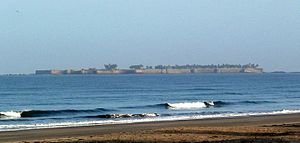Sindhudurg Fort
This article needs additional citations for verification. (October 2007) |
| Sindhudurg Fort | |
|---|---|
| Part of Maharashtra | |
| Sindhudurg district, Maharashtra | |
 Sindhudurg fortress from the mainland. | |
| Coordinates | 16°02′38″N 73°27′41″E / 16.043769°N 73.461416°E |
| Type | Island |
| Site information | |
| Owner | Government of India |
| Controlled by | |
| Open to the public | Yes |
| Site history | |
| Built | 1664 |
| Built by | Hiroji Indulkar (Chief Architect) |
Sindhudurg Fort (Marathi pronunciation: [sin̪d̪ʱud̪uɾɡ]) is a historical sea fort located in Arabian Sea near the Konkan region of Maharashtra in Western India.[1] The fort, commissioned by Chhatrapati Shivaji, was constructed between 1664 and 1667.[2] The fort lies off the shore of Malvan taluka of the Sindhudurg District in the Konkan region of Maharashtra, 450 kilometres (280 mi) south of Mumbai.[3] It is a protected monument under the Archaeological Survey of India.[4][5]
History
[edit]Sindhudurg island-fort was built under Shivaji I, the founder of the Maratha Empire.[6] The fort's foundation stone was laid on 25 November 1664.[7] Construction was supervised by Hiroji Indulkar who took assistance from Portuguese engineers of Goa.[8][9] The fort's main objective was to counter the rising influence of English, Dutch, French and Portuguese merchants in the Konkan coast, and to curb the rise of Siddhis of Janjira.[10] The fort was built on a small island known as the Khurte island.
Structural details
[edit][Chatrappati Shivaji Maharaj] had brought 200 Vaddera people to build this fort. Over 4,000 pounds of lead were used in the casting and foundation stones were firmly laid down. Construction started on 25 November 1664. Built over a period of three years (1664-1667), the sea fort is spread over 48 acres, with a two-mile (3 km) long rampart, and walls that are 30 feet (9.1 m) high and 12 feet (3.7 m) thick. The massive walls were designed to serve as a deterrent to approaching enemies and to the waves and tides of the Arabian Sea. The main entrance is concealed in such a way that no one can pinpoint it from outside.[citation needed]
The number of permanent residents living in the fort has been in decline since its abandonment. Most residents have moved out due to inadequate employment opportunities but some families remain. The fort is closed for tourists during rainy season due to high tides.[citation needed]
See also
[edit]References
[edit]- ^ "Sindhudurg Fort". Maharashtra Bhraman. 29 November 2019. Retrieved 4 December 2023.
- ^ "History | SINDHUDURG | India". 13 August 2019. Archived from the original on 13 August 2019. Retrieved 4 December 2023.
- ^ "Sindhudurg Fort Location". Archived from the original on 5 August 2012. Retrieved 18 May 2012.
- ^ "List of the protected monuments of Mumbai Circle district-wise" (PDF). Archived from the original on 6 June 2013.
- ^ "Centrally Protected Monuments/Sites: State-wise and Circle-wise March, 2023" (PDF). Archived from the original (PDF) on 4 December 2023. Retrieved 4 December 2023.
- ^ Sen, Sailendra (2013). A Textbook of Medieval Indian History. Primus Books. p. 207. ISBN 978-9-38060-734-4.
- ^ "झुंज सिंधुदुर्ग किल्ल्याची..." eSakal - Marathi Newspaper (in Marathi). 27 September 2017. Retrieved 4 December 2023.
- ^ Centre for Cultural Resources and Training (2015). Forts of Maharashtra. Public Resource. Centre for Cultural Resources and Training (CCRT).
- ^ Apte, Bhalchandra Krishna (1973). A History of the Maratha Navy and Merchantships. State Board for Literature and Culture.
- ^ "Tour De Kokan : Explore Various Places & Information". Best Places to visit - Travel Information - Tour De Konkan.

